Look Who's Stalking: 10 Creepiest Apps For Phones, Facebook, More
Thanks to the ruckus surrounding "Girls Around Me," we now know how easy it is for apps and other services to repackage our personal data for disturbingly creepy ends. The Girls Around Me app might be the latest report to blow up in a big way over this issue, but it certainly hasn't been the first. Here are the top 10 creepiest apps and services we’ve heard of in the past few months.
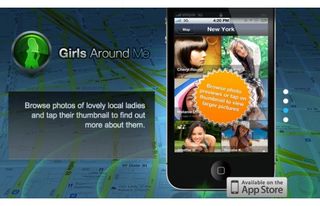
Girls Around Me
Girls Around Me was an iOS app that leveraged Foursquare data to detect women who checked into a user’s neighborhood. Dropping their pictures as pins on a Google map, the app let its users leisurely peruse a directory of local ladies, and after they picked one who piqued their interest, they could tap on her picture to connect to her Facebook account, see her full name and profile pictures, or even message her within the app. Although Russian-based app developer i-Free has contended that it hasn’t done anything wrong -- all of the data it was dishing out to users was unrestricted information, voluntarily provided by Facebook and Foursquare users -- the app’s stated goals and purpose have been suspect to say the least. “In the mood for love, or just after a one-night stand?” the official website reads. “Girls Around Me puts you in control! Reveal the hottest nightspots, who’s in them, and how to reach them…” Since news of the creepy service broke, Foursquare cut off the API access that the app relied upon to function, prompting developers to pull the product from the iTunes Store.
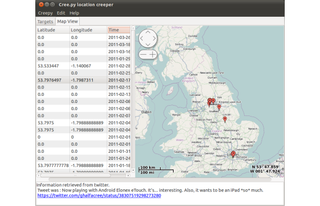
Creepy
Desktop application Creepy can be described exactly how it's named. Touting itself as a "geolocation information aggregator," the open-source software lets you track users using public information gathered from their Twitter and Flickr accounts. As long as the user had location detection switched on while using these apps, Creepy can trace the data and compile it on map providers like Google Maps, Virtual Maps and Open Street Maps. We often post location data without a second thought, thinking that a status update or two made public won't get us into trouble. But string it all together in a historic, visual format, and things can indeed turn creepy very quickly.
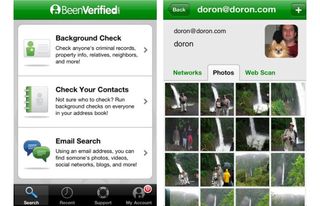
Background Check by BeenVerified
An app that Apple previously yanked because of “privacy concerns,” Background Check boomeranged back to the iTunes Store last year and even came out in a new Android flavor. The app lets you run a background check on anyone using just their name or email address, and checks for relatives, property, current contact info, criminal history and social media records. You get one free report a month, but if that doesn’t cut it for you, you can purchase extra background checks for 99 cents each, or a pack of 20 for $9.99. “Imagine sitting at the bar and finding out the truth about the person who just bought you a drink all before they return to the bathroom,” the app description reads. Yep, imagine a world where this service is completely free and available. Not at all creepy.
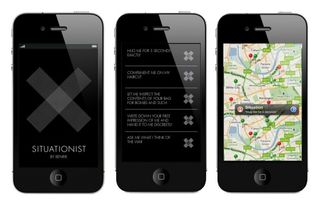
Situationist
An odd little app for the iPhone, Situationist let you upload a photo of yourself along with a list of things you wanted a stranger to do to you in public. Situations could range from friendly ("Hug me for 5 seconds") to renegade ("Help me rouse everyone around us into revolutionary fervour and storm the nearest TV station"). In any case, it gives creepy strangers another excuse to approach people they didn’t know. As of this writing, Situationist is unavailable for download at the iTunes Store.
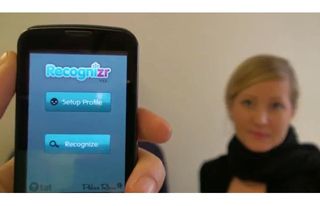
Recognizr
Previously shown off at Mobile World Congress 2010 in Barcelona, Recognizr lets you point your smartphone camera at somebody's face, after which their contact info and social network updates pop up. If this app had been made freely available, millions of virtual eyes might be stowed away in every mobile phone owner's pockets.
Is the app useful? Moderately. Scary? Absolutely. Thankfully, no working download or demo can be found now.
Stay in the know with Laptop Mag
Get our in-depth reviews, helpful tips, great deals, and the biggest news stories delivered to your inbox.
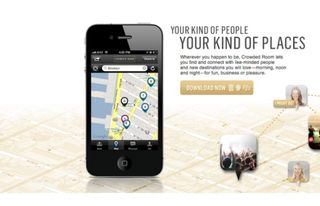
Crowded Room
An app that introduced the idea of the "might go," Crowded Room is like a Foursquare check-in, but with a twist: It’s a check-in for the future, and you may or may not even decide to show up. The app lets you look up people who have similar prospective plans (if they've allowed the plans to be viewed publicly) and message them.
The premise is that you might meet up with them because you have things in common -- you might frequent the same places or have a mutual friend. But is that a strong enough link to open yourself up to an encounter with a potentially dangerous stranger?
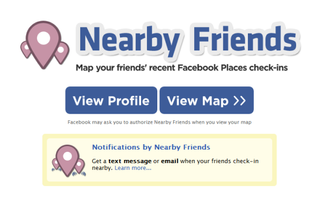
Nearby Friends
Nearby Friends is a Facebook app that plots Facebook friends' check-ins -- both past and present -- on Google Maps. Though it can only make use of opt-in information posted on Facebook, it can slurp up a frightening amount of data including a user’s entire geographical history and check-ins that others have tagged them in. Thought your check-in to The Black Keys gig at Madison Square Garden was cool and harmless? Think again.
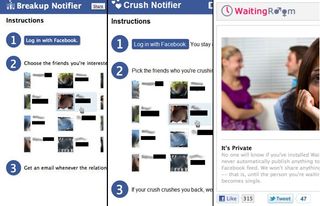
Facebook Breakup Notifier Apps
A crop of disturbing Facebook apps turned up early last year, alerting its user to a target’s profile change if they signed up with the service. Breakup Notifier sends users a notification whenever a friend they were interested in changes their relationship status to single. Sure, you have to be friends with the person you're interested in before you can even avail of the service, but the thought of someone being able to pounce on you as soon as you're available is more than just a little disconcerting. Also by the maker of Breakup Notifier, Crush Notifier is a Facebook app that allows you to choose people you are crushing on, and the service sends them an anonymous notification email. If the feeling is mutual, you get a similar email notifying you of your match. But wouldn't it be more ideal to simply man up and be direct with your feelings instead of using such a service? WaitingRoom lets you anonymously enter a friend's name within the service to give them a hint that they have options. There's a waiting period of two days after the target’s break-up -- because this app is different, it's tasteful -- after which the application discloses the identities of his/her admirers.
